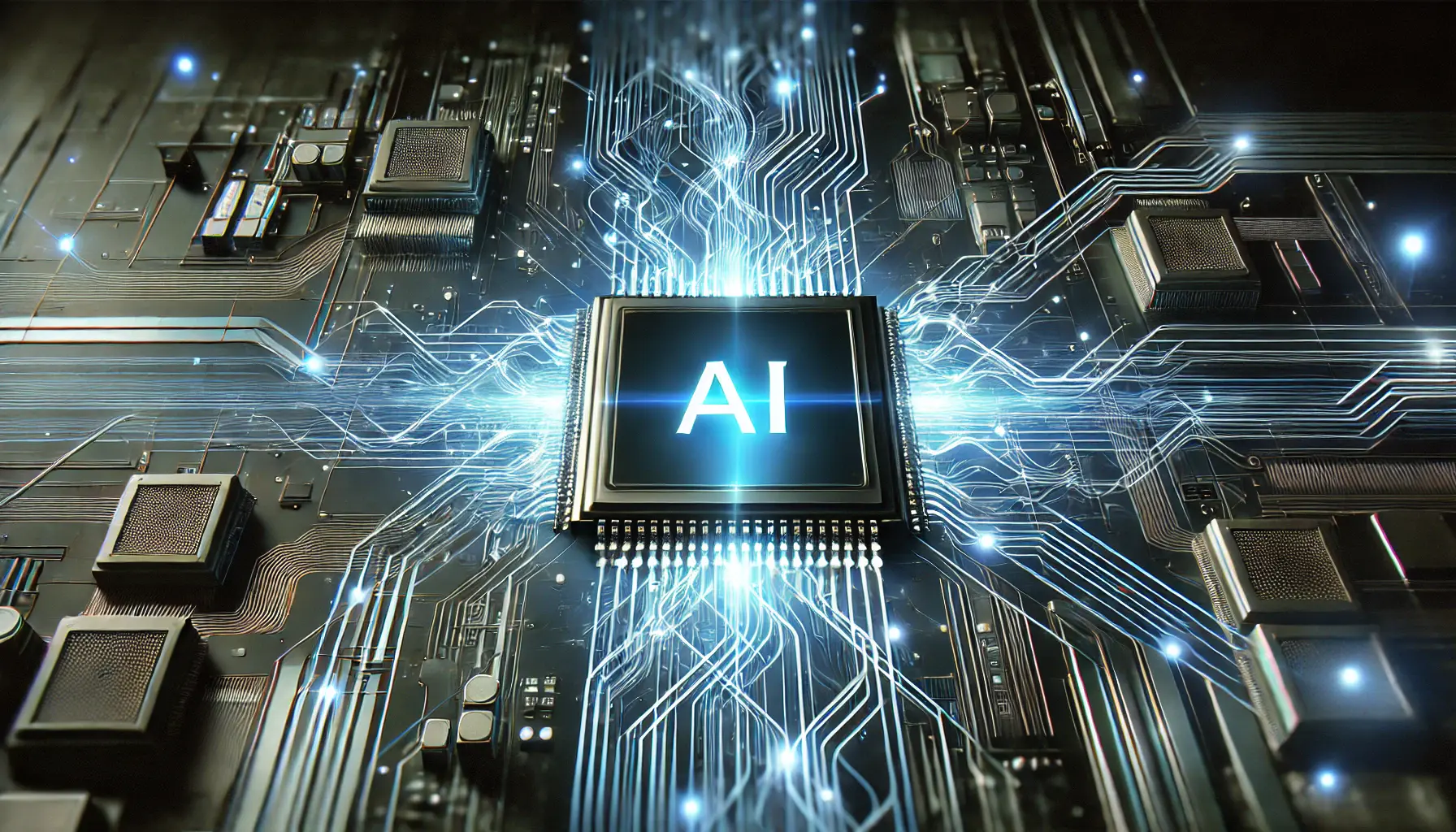In the rapidly evolving landscape of artificial intelligence, breakthroughs often redefine our understanding and capabilities.
One such remarkable advancement is DeepSeek R1, an AI model that has garnered significant attention for its innovative approach and impressive performance.
But what exactly is DeepSeek R1, and why is it making waves in the AI community?
Let’s delve into its origins and the unique features that set it apart.
Introduction to DeepSeek R1
DeepSeek R1 is an AI model from the Chinese startup DeepSeek, founded in 2023 by Liang Wenfeng.
This model has been designed to outperform in tasks that require deep reasoning, mathematical problem-solving, and coding—making it a tough competitor in the AI arena.
Unlike most conventional AI models that rely on large-scale data and continuous human intervention for training, DeepSeek R1 works differently.
By leveraging reinforcement learningA machine learning technique where an AI agent learns by receiving rewards or penalties based on its actions. techniques, it enhances its reasoning capabilities, developing a more advanced information processing system that delivers accurate results while consuming fewer computational resources.
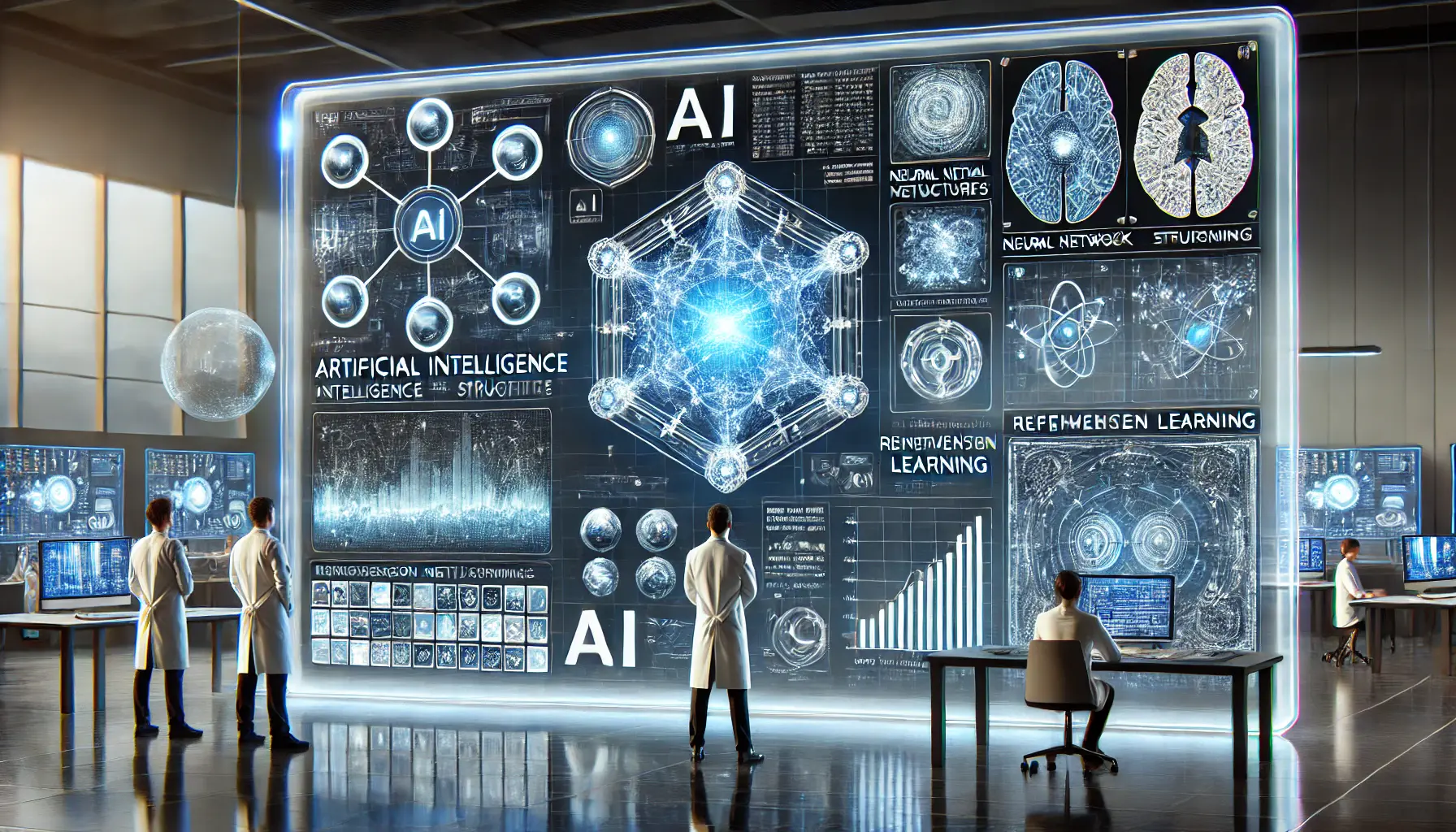
A high-tech AI system showcasing its key features, including reinforcement learning and problem-solving capabilities.
Key Features of DeepSeek R1
- Reinforcement Learning: Empowers the model to improve decision-making and reasoning without excessive human input.
- Efficient Resource Usage: Requires less computational power compared to traditional AI models.
- Advanced Problem-Solving: Excels in complex reasoning tasks such as mathematics and coding.

A high-tech environment where AI researchers collaborate in an open-source setting, sharing knowledge and innovations.
Open-Source Accessibility
One of the standout features of DeepSeek R1 is its open-source nature.
The model is widely accessible, allowing researchers, developers, and organizations to use and expand its capabilities without the constraints of a proprietary system.
This openness not only fosters collaboration but also accelerates innovation within the AI community.
In a nutshell, DeepSeek R1 represents a huge leap in AI development, combining advanced reasoning with an open-source framework.
Its unique approach to training and resource efficiency sets it apart from other models, making it a subject of interest for anyone keen on the future of artificial intelligence.
DeepSeek R1 stands out due to its reinforcement learning capabilities, enabling superior problem-solving in mathematics and coding with optimized computational efficiency.

An AI research facility highlighting the latest innovations in artificial intelligence, including neural networks and quantum computing.
Technological Innovations in DeepSeek R1
DeepSeek R1 has introduced several groundbreaking technological innovations that set it apart in the field of artificial intelligence.
Let’s explore these advancements in detail.

An advanced AI research environment demonstrating reinforcement learning and sequential reasoning through a holographic neural network.
Reinforcement Learning and Chain-of-Thought Reasoning
One of the novel aspects of DeepSeek R1 is its use of reinforcement learning to enhance reasoning capabilities.
This model refines its decision-making process through iterative training using a method called Group Relative Policy Optimization (GRPO), a variant of Proximal Policy OptimizationA reinforcement learning algorithm designed to improve training stability and efficiency in AI models. (PPO).
This enables DeepSeek R1 to construct elaborate chains of reasoning, commonly known as ‘chain-of-thought’ reasoning, which significantly improves its ability to solve complex problems in mathematics, coding, and natural language understanding.
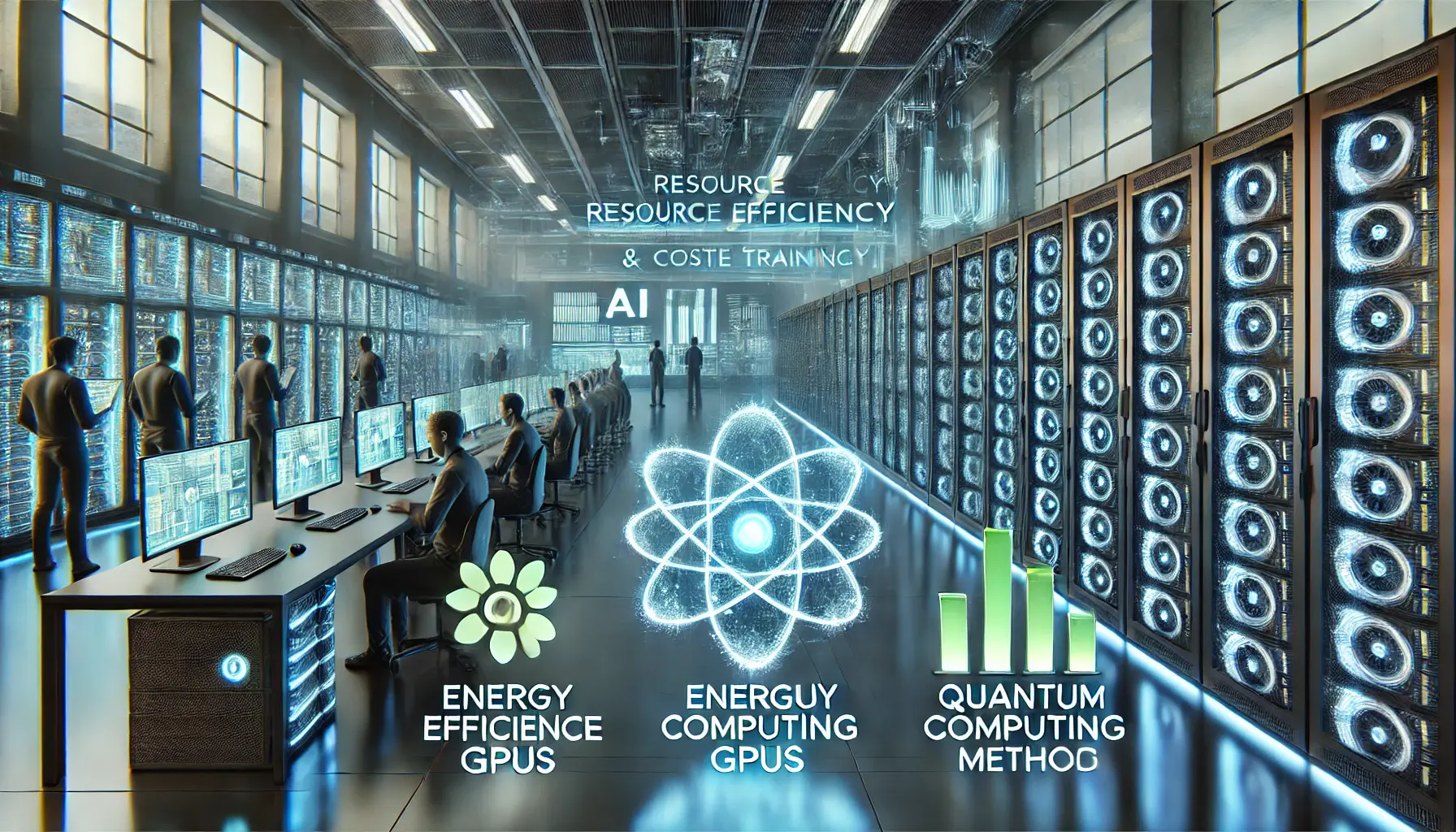
A high-tech data center demonstrating resource-efficient AI model training processes with energy-efficient GPUs and quantum computing.
Resource Efficiency and Cost-Effective Training Methods
DeepSeek R1 excels in resource efficiency.
Unlike many AI models that heavily depend on computational power, DeepSeek R1 was trained using approximately 2,000 Nvidia GPUs of the H800 series chip over a period of about 55 days.
The total training cost was around $5.58 million, which is roughly one-tenth of the expenditure by some U.S.
tech giants for training similar AI models.
- Optimized Resource Usage: Uses fewer GPUs and lowers costs while maintaining high performance.
- Faster Training: Takes significantly less time compared to traditional models.
- More Accessible AI Research: Reduces financial barriers, enabling smaller organizations and researchers to engage in advanced AI development.
By leveraging these technological innovations, DeepSeek R1 not only enhances AI capabilities but also establishes new standards for efficiency and accessibility in AI research and development.
By incorporating Group Relative Policy Optimization (GRPO), DeepSeek R1 refines decision-making, enhancing its chain-of-thought reasoning and computational efficiency.

A global collaboration in a high-tech AI lab, emphasizing the worldwide impact of AI advancements on research.
Impact on Global AI Research
The emergence of DeepSeek R1 has significantly influenced the global AI research community, challenging existing paradigms and fostering new avenues of exploration.

A high-tech lab where an AI system’s performance in real-world applications and benchmarks is analyzed.
Performance in Benchmarks and Real-World Applications
DeepSeek R1 has demonstrated performance on par with leading AI models in tasks such as mathematics, coding, and natural language reasoning.
Its efficiency and effectiveness have been recognized as a potential challenge to the global dominance of American AI models.
- Mathematical Reasoning: Excels in solving complex equations and logical problems.
- Advanced Coding Capabilities: Generates optimized and accurate code, making it a strong tool for developers.
- Natural Language Processing: Understands and generates human-like text with high precision.
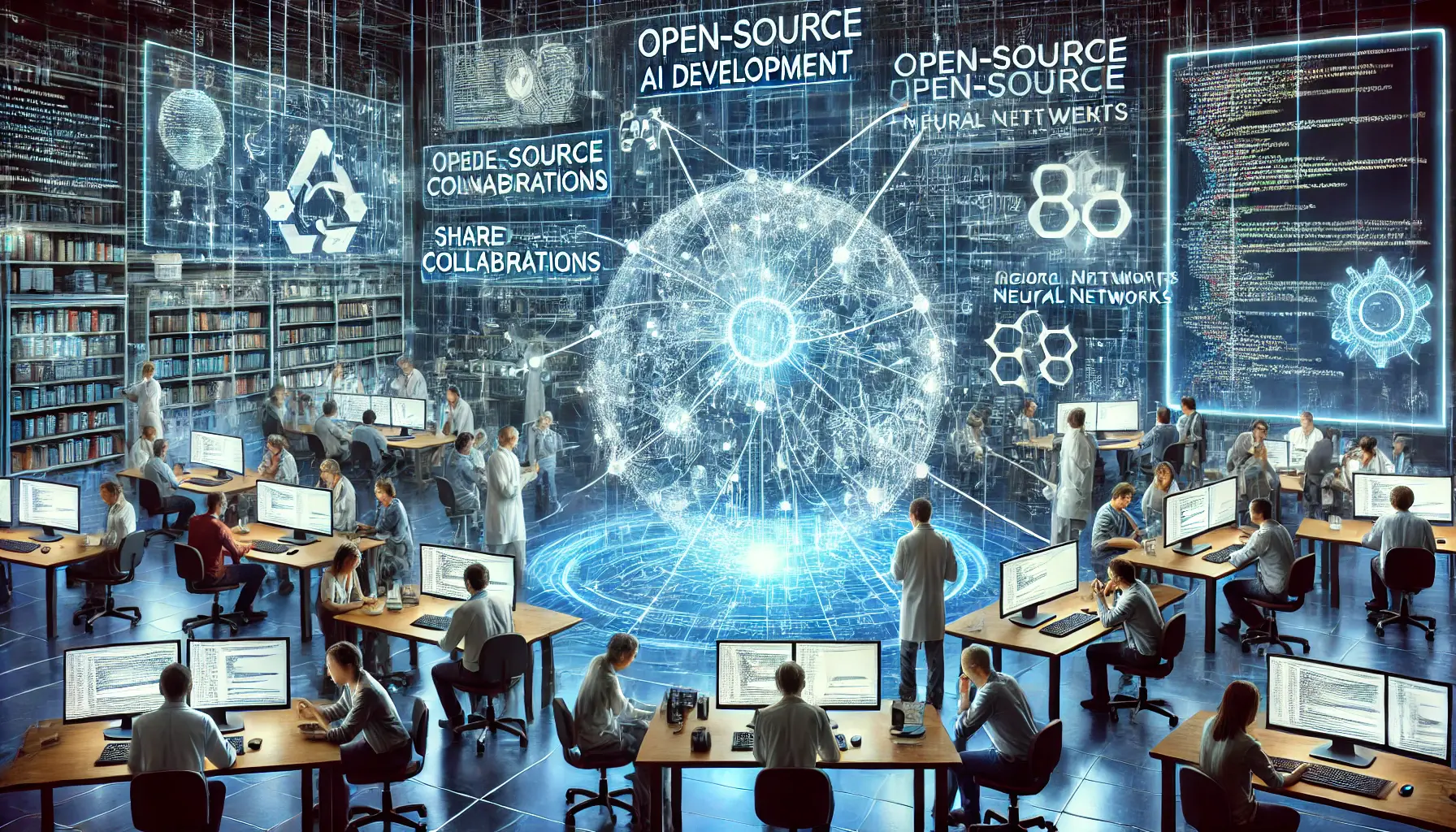
A futuristic open-source AI development lab showcasing global collaboration among researchers and engineers.
Influence on Open-Source AI Development and Collaboration
The open-source nature of DeepSeek R1 has encouraged collaboration among researchers, developers, and organizations worldwide.
By making its code and training methodologies publicly available, DeepSeek fosters a culture of transparency and shared learning, accelerating innovation in AI research.
- Encouraging Open Research: Enables developers and AI enthusiasts to contribute and improve AI technologies.
- Fostering AI Transparency: Provides insights into AI model development, making AI less of a black box.
- Competitive Innovation: Challenges established tech giants and promotes a more democratized AI landscape.
In summary, DeepSeek R1 has not only matched the performance of existing AI models but has also paved the way for a more collaborative and open AI research environment.
Its impact is shaping the future of AI advancements and influencing how AI technologies are developed and shared globally.
DeepSeek R1’s open-source approach is revolutionizing AI research by encouraging collaboration and transparency in model development.

A high-tech financial district illustrating the economic impact of AI innovations on global market trends.
Economic and Market Implications of DeepSeek R1
The introduction of DeepSeek R1 has sent ripples through the global economic landscape, particularly within the technology and artificial intelligence sectors.
Its emergence has prompted significant reactions from major tech companies and investors, reshaping market dynamics and influencing investment strategies.
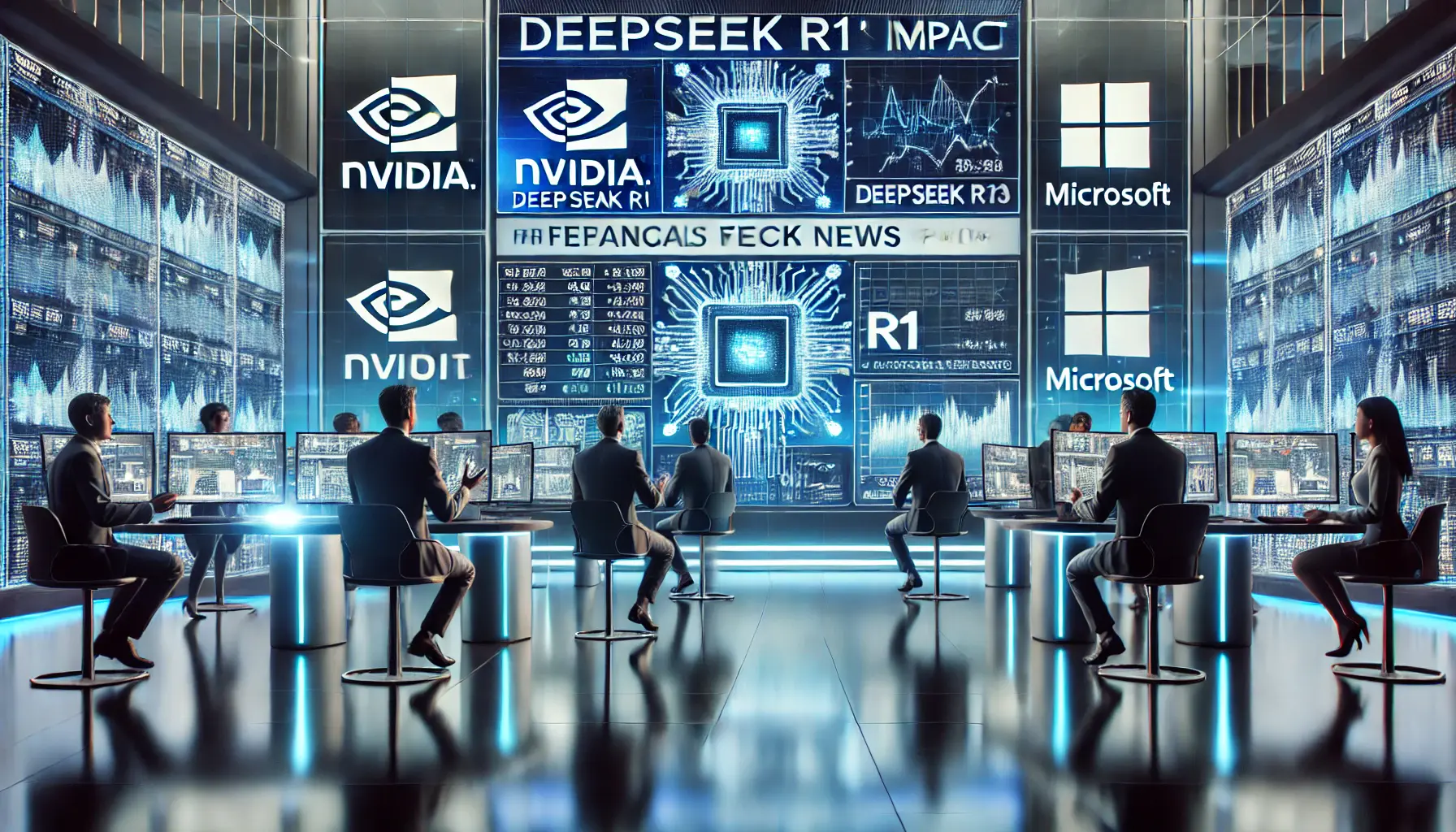
A sleek financial news room discussing the impact of AI innovations like DeepSeek R1 on major tech companies and investors.
Reactions from Major Tech Companies and Investors
Following the release of DeepSeek R1, several leading technology firms experienced notable market fluctuations.
The announcement drove down the stock of Nvidia, causing a record market-cap loss, as investors adjusted for competition from DeepSeek R1’s advancements.
Similarly, stocks of Microsoft and Alphabet, Google’s parent company, also declined due to market concerns about a shifting AI paradigm.
Investors are now closely monitoring these developments, recognizing that DeepSeek R1’s cost-effective and efficient AI model could disrupt established market leaders and alter future investment trajectories.

A modern investment room focused on strategic shifts in AI funding and infrastructure investment decisions.
Potential Shifts in AI Funding and Infrastructure Investments
The cost-efficiency demonstrated by DeepSeek R1 is poised to influence funding allocations within the AI industry.
Traditionally, developing advanced AI models required substantial financial investments, particularly in high-performance computing infrastructure.
However, DeepSeek R1’s approach, which delivers high performance without excessive computational resources, may lead investors to reassess the need for heavy capital expenditureFunds used by a company to acquire, upgrade, or maintain physical assets like technology infrastructure. on AI projects.
- Democratization of AI Development: Reduces financial barriers, allowing smaller firms and startups to compete.
- Optimized Resource Utilization: Encourages companies to invest in more efficient AI architectures.
- Increased Innovation and Competition: Lowers entry costs, fostering a more diverse AI ecosystem.
In other words, DeepSeek R1 is reshaping economic expectations and investment strategies in the AI sector.
Its influence is prompting both established companies and new entrants to reassess their approach to AI development and funding, signaling a transformative period in the technology market.
The cost-effectiveness of DeepSeek R1 is challenging established AI models, leading to shifts in investment strategies and market competition.
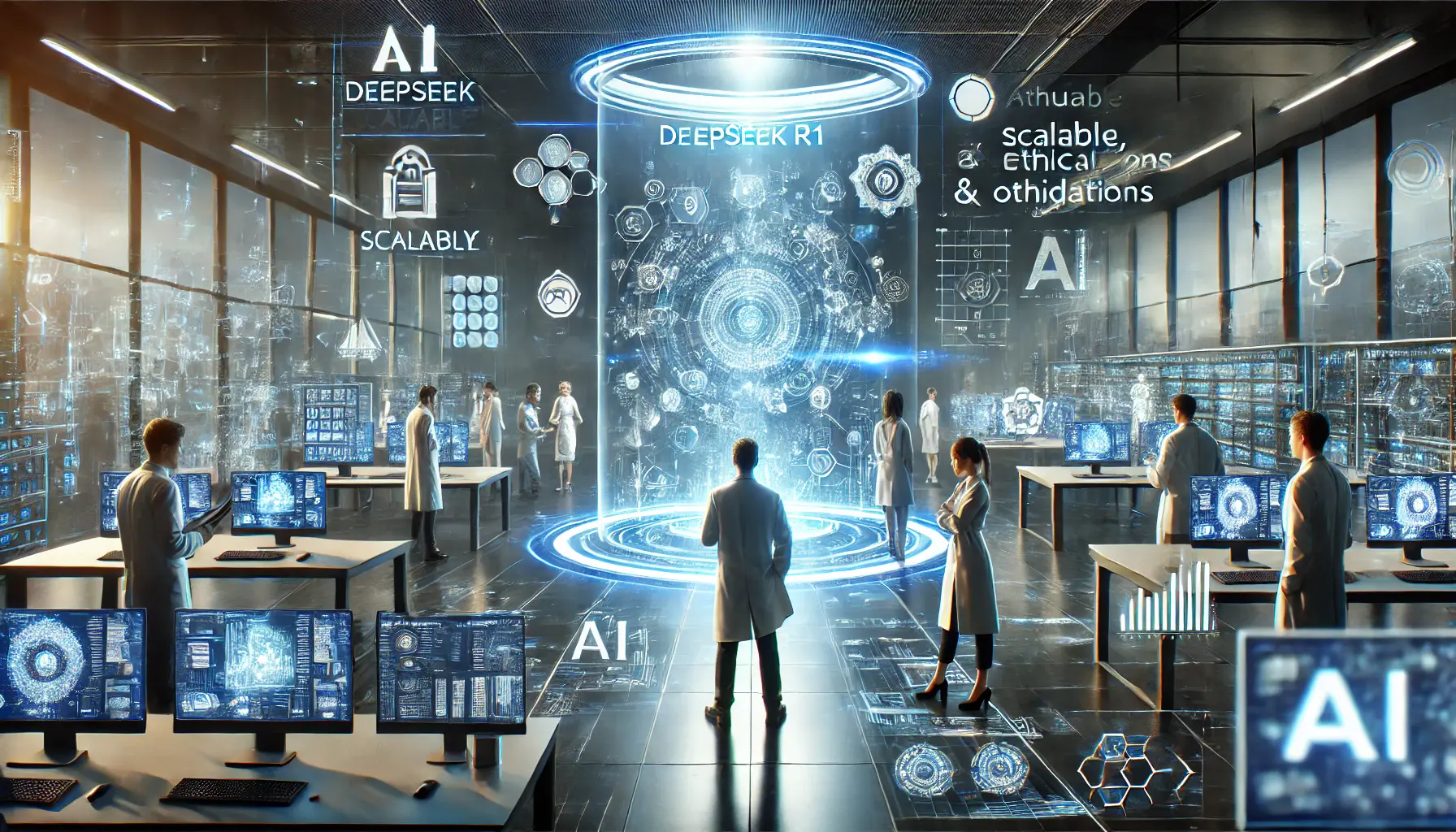
A high-tech AI lab highlighting the potential advancements and obstacles in DeepSeek R1’s future, including scalability and ethical considerations.
Future Prospects and Challenges for DeepSeek R1
As DeepSeek R1 continues to make waves in the artificial intelligence landscape, it’s essential to consider both its future potential and the challenges it may encounter.
Let’s delve into the anticipated advancements and the hurdles that lie ahead.
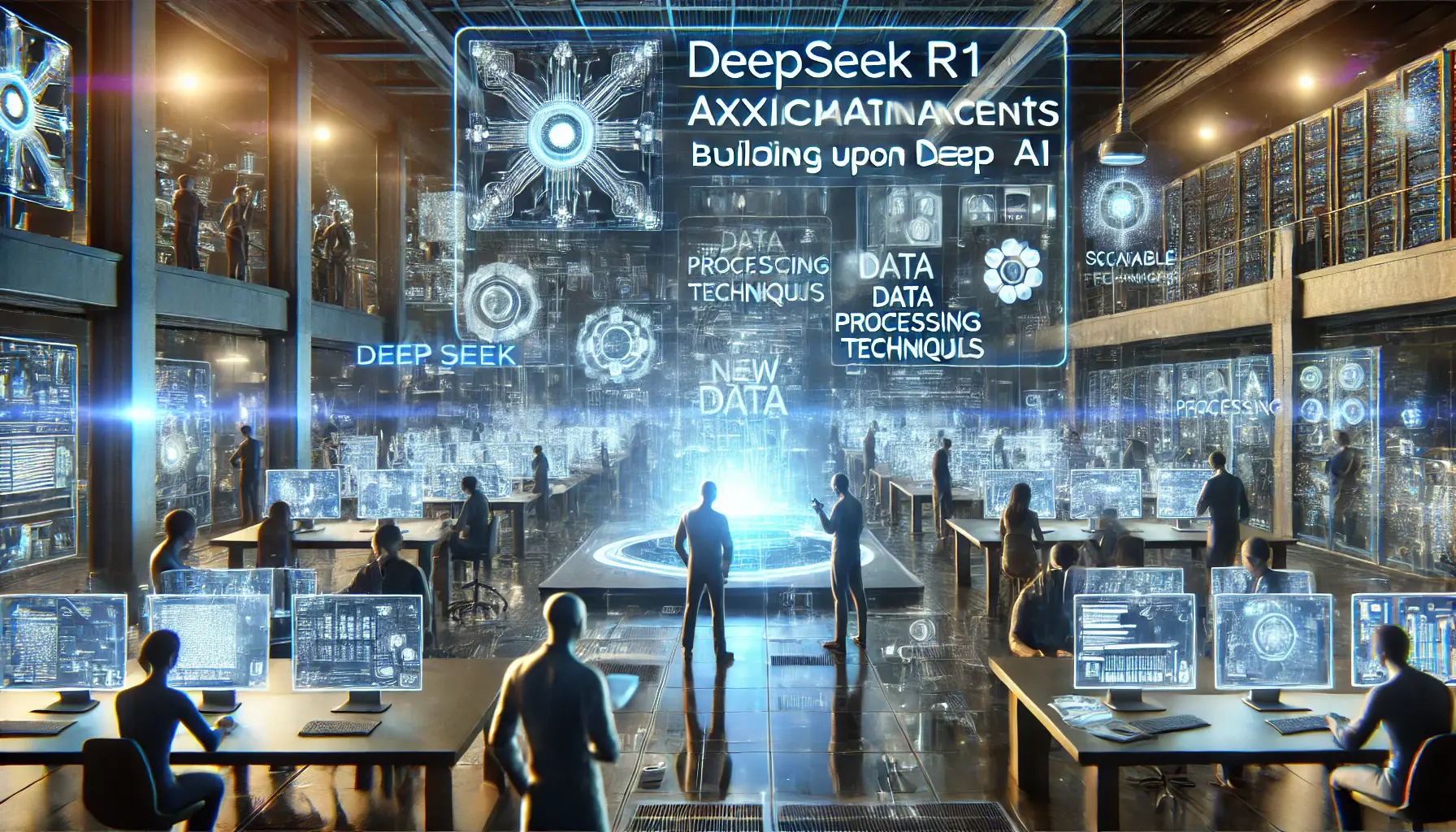
A high-tech AI lab visualizing the future advancements and breakthroughs building upon DeepSeek R1.
Anticipated Advancements Building Upon DeepSeek R1
The success of DeepSeek R1 has set the stage for several promising developments:
- Enhanced Efficiency: Future iterations are expected to further optimize computational resources, making advanced AI more accessible and cost-effective.
- Broader Applications: Expansion into diverse fields such as healthcare, finance, and education, leveraging its reasoning capabilities to solve complex industry-specific problems.
- Global Collaboration: Encouraging international partnerships to foster innovation and share knowledge across borders.

A high-tech review process for AI technologies, focusing on ethical considerations and regulatory compliance.
Ethical Considerations and Regulatory Scrutiny
Despite its advancements, DeepSeek R1 faces several challenges:
- Data Privacy: Concerns have emerged regarding data storage and usage, particularly in terms of compliance with international privacy standards.
- Censorship and Bias: Observations indicate that the model may exhibit censorship on politically sensitive topics, raising questions about content neutrality and freedom of expression.
- Security Risks: Potential vulnerabilities could be exploited for malicious purposes, necessitating stringent safeguards against misuse.
Overcoming these challenges will be crucial for DeepSeek R1 to maintain trust and ensure its responsible integration into various sectors.
As the AI community continues to expand, balancing innovation with ethical considerations will be critical for sustaining progress.
Despite its advancements, DeepSeek R1 must address concerns related to data privacy, censorshipThe suppression or regulation of speech, communication, or information by authorities. biases, and AI security risks.
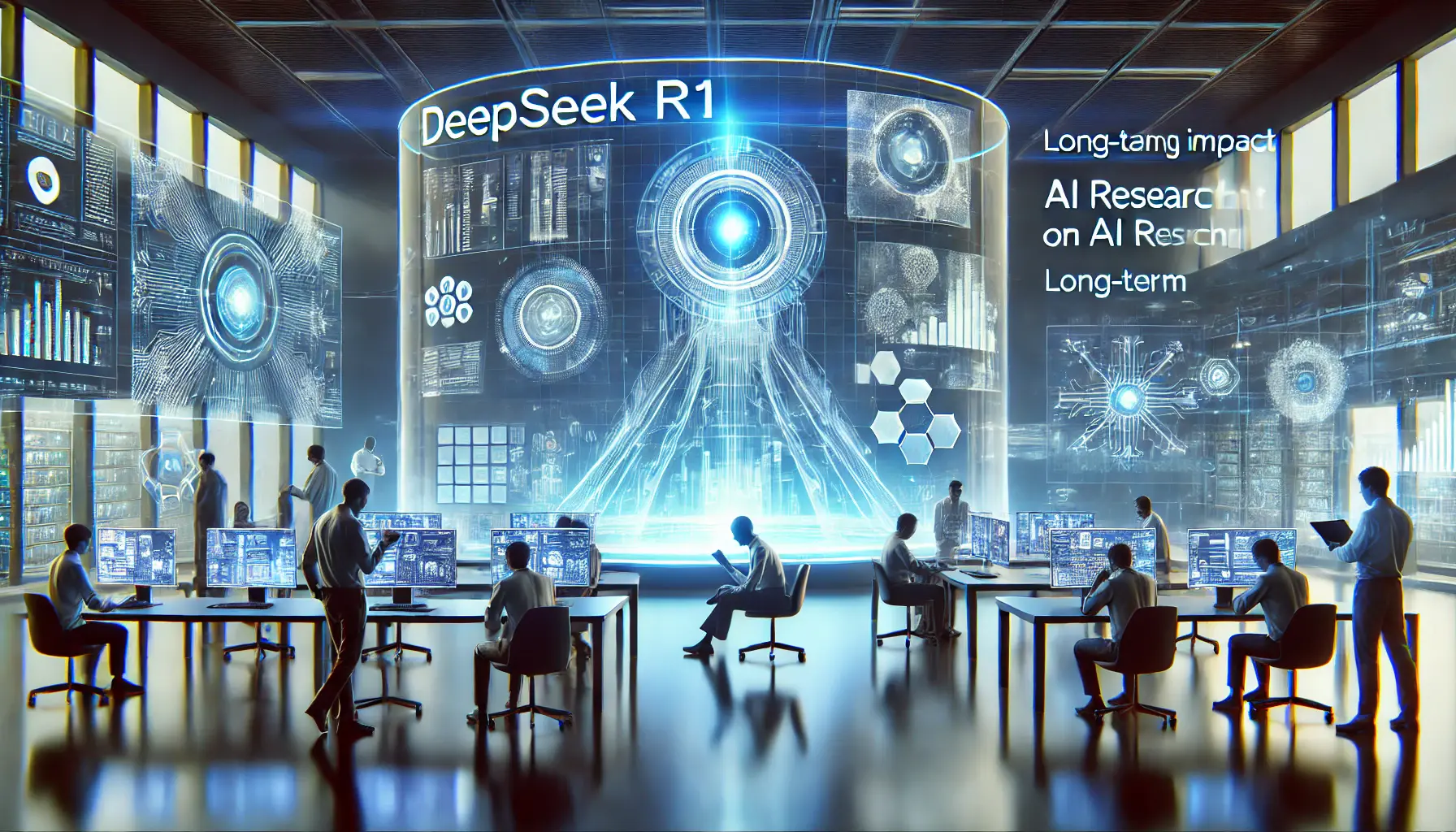
A high-tech AI lab illustrating the transformative long-term impact of DeepSeek R1 on AI research and development.
The Lasting Impact of DeepSeek R1 on AI Research and Development
The emergence of DeepSeek R1 has created a turning point for artificial intelligence, driving innovation, efficiency, and accessibility.
From advanced reinforcement learning methods to its open-source approach, this model has not only challenged the status quo but also paved the way for a more inclusive and collaborative future in AI development.
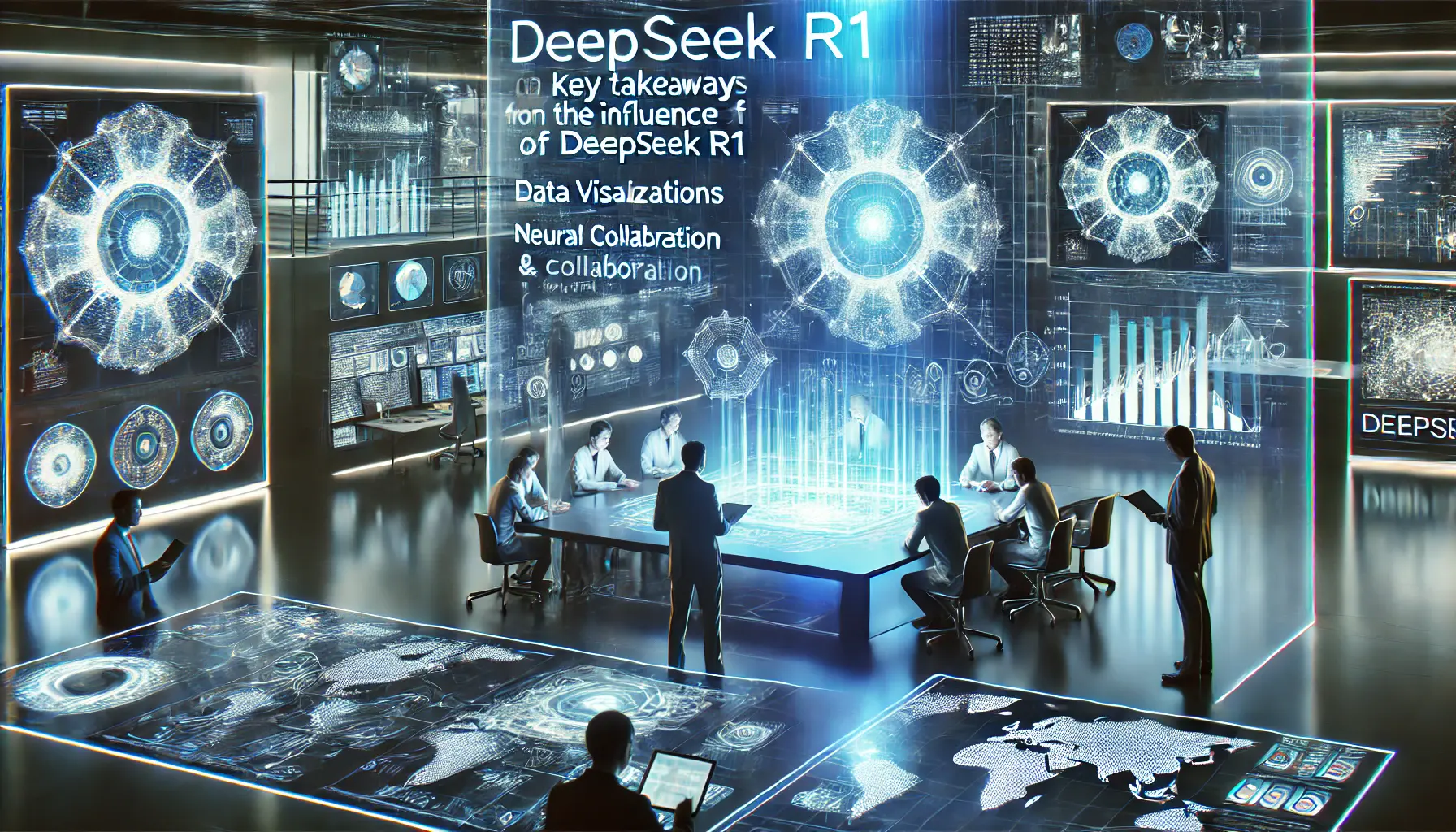
A high-tech AI research lab visualizing the key takeaways from the global influence of DeepSeek R1 on AI research and development.
Key Takeaways from DeepSeek R1’s Influence
- Technological Innovations: By leveraging reinforcement learning and chain-of-thought reasoning, DeepSeek R1 has demonstrated exceptional problem-solving abilities across multiple domains.
- Global AI Research Impact: The model’s open-source nature has encouraged worldwide collaboration, enabling more researchers to contribute and build upon its foundation.
- Economic and Market Disruptions: DeepSeek R1 has influenced stock market trends, challenged industry leaders, and reshaped investment strategies in AI infrastructure and development.
- Future Prospects: With continued advancements, DeepSeek R1 is expected to refine its efficiency further and expand into broader applications, including healthcare, finance, and education.
- Ethical and Regulatory Challenges: The AI community must address concerns regarding data privacy, censorship biases, and security risks to ensure responsible and fair usage.

A high-tech AI laboratory where researchers shape the future of AI through advanced models, algorithms, and innovation.
Shaping the Future of AI
As DeepSeek R1 continues to develop, its impact on AI research and commercialization will become even more tangible.
The combination of cost-efficient training and human-like reasoning has the potential to democratize AI access, making advanced intelligence available to startups, large enterprises, and academic institutions alike.
The ethical considerations surrounding AI models like DeepSeek R1 will also remain a critical area of discussion.
As AI becomes increasingly integrated into various industries, regulatory frameworks will need to evolve to address concerns about privacy, fairness, and accountability.

A high-tech AI lab symbolizing reflection on AI’s journey and future advancements.
Final Thoughts
The journey of DeepSeek R1 is far from over.
Continuous research and improvements are expanding its capabilities, increasing its adoption, and pushing the boundaries of artificial intelligence.
Whether by reshaping AI research methodologies, influencing business strategies, or addressing ethical challenges, DeepSeek R1 is undeniably a milestone in the ongoing evolution of AI innovation.
Moving forward, the AI industry must strike a balance between rapid technological advancement and responsible development.
Models like DeepSeek R1 have the potential to ensure that the future of artificial intelligence serves humanity in the best and most ethical way possible.
DeepSeek R1 is paving the way for an AI future that prioritizes accessibility, efficiency, and ethical development.
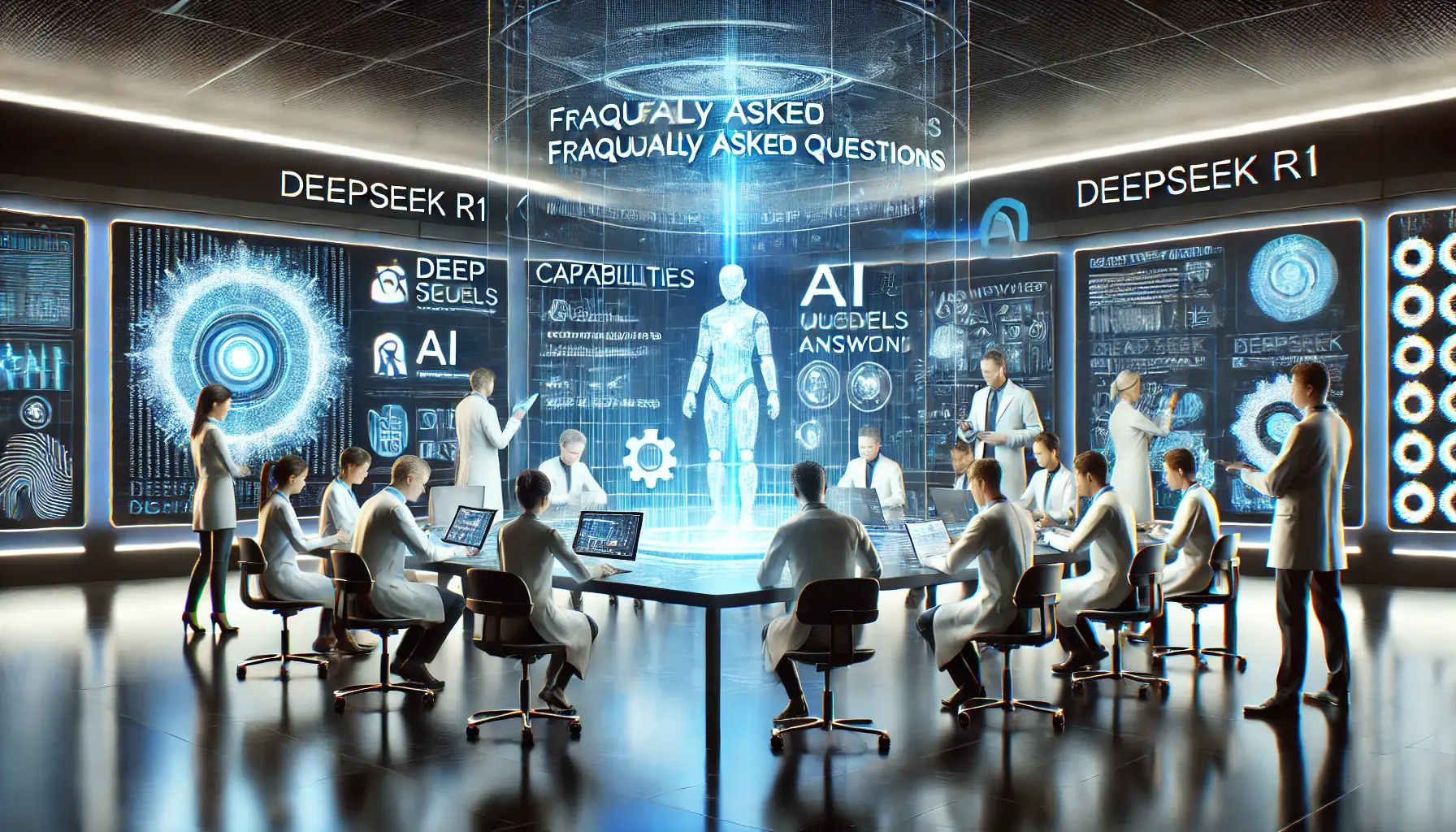
A high-tech AI lab where researchers explore frequently asked questions about DeepSeek R1’s capabilities and impact.
DeepSeek R1: Frequently Asked Questions
DeepSeek R1 is an open-source AI model developed by the Chinese startup DeepSeek.
It is designed for advanced reasoning tasks, including mathematics, coding, and natural language understanding.
Unlike many AI models, DeepSeek R1 utilizes reinforcement learning to enhance its reasoning capabilities, allowing it to solve complex problems more efficiently and effectively.
Yes, DeepSeek R1 is open-source and freely available.
Researchers and developers can access and build upon its capabilities without proprietary restrictions.
DeepSeek R1 was trained using approximately 2,000 Nvidia H800A high-performance GPU model designed for AI training and computational workloads. GPUs over 55 days.
However, for smaller-scale applications, it can run on less powerful hardware with some performance trade-offs.





